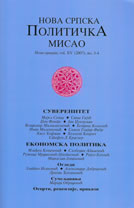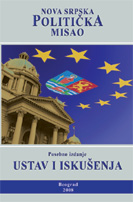| NSPM in English | |||
Reagan Plagiarized |
 |
 |
 |
| среда, 16. април 2008. | |
|
Most Republicans—and many Democrats (some more reluctantly than others) proclaim that one of the reasons Ronald Reagan's foreign policy was so successful was that this president was able to balance his commitment to American ideals with an understanding of what the strategic interests of the country required. Whether those who claim to be Reagan's heirs today would be able to do this remains open to debate. Why? Well, we are being told that the United States cannot work with countries which do not share our political values, that the United States has not only the right but the obligation to intervene in the affairs of others if we judge their domestic political situation to be wanting, and that the only fit partners for the United States in world affairs are other democracies. We hear that the assertion that each country should be able to freely determine its own social, political and economic systems in accordance with the desires of their own citizens is un-American. (All of this is on display in Robert Kagan's latest essay in the New Republic ). And Kagan's advice has been taken to heart by Senator McCain (and speaking of advisors, Senator McCain recently distanced himself from former Secretary of State James Baker, saying that he “is not, quote, an advisor of mine. . . . I certainly admire and respect Secretary Baker . . . but that does not mean that Secretary Baker and I are in agreement on every issue.”) Indeed, the Senator's speech to the World Affairs Council was much more in alignment with Kagan than Baker—especially when he declared that unless countries moved “toward political liberalization, our relationship will be based on periodically shared interests rather than the bedrock of shared values.” But would Reagan agree? It is important to remember that Reagan had no difficulty with America coexisting with nondemocratic or even noncapitalist nations—provided that such nations did not threaten the prosperity or stability of the United States and its allies. He believed that, over time—and as long as no other power sought to use force to control a country's freedom to choose—a nondemocratic, noncapitalist country would discover for itself the virtues of a free-market, liberal-democratic system. He did not believe it wise or prudent for the United States to force the pace of history. Nor did he rule out nondemocracies as fit partners for the United States to achieve its global objectives. In February 1985, Ronald Reagan, the “apostle of freedom,” stood beside Saudi Arabia 's King Fahd. In welcoming this absolute monarch—whose position was ratified by tradition, history and culture, not the ballot box—to the White House, the president declared: The friendship and cooperation between our governments and people are precious jewels whose value we should never underestimate. The positive nature of our relations demonstrates that cultural differences, as distinct as our own, need not separate or alienate peoples from one another. . . . Destiny has given us different political and social systems, yet with respect and good will, as our two countries have demonstrated, so much can be accomplished. . . .Hard to imagine a U.S. politician making such a statement today! Reagan, of course, found common ground with countries espousing a wide variety of social and economic systems—not just democracies—because for him, the “free world” consisted of all those states fighting against Soviet attempts to impose their version of communism. This is why Reagan could say, “The citizens of the Western democracies and the Muslim world, by all that they believe to be true and just, should stand together in opposition to those who would impose dictatorship on all of mankind.” (Is this not a better foundation on which to rebuild U.S. alliances in the Middle East , by the way?) Reagan's views found a much fuller expression during his historic April 1984 trip to the People's Republic of China . Reagan used every opportunity to share with his Chinese audiences his beliefs about the American way of life and its system of governance. He believed he had a unique opportunity to act as an “prophet of liberty” and his speeches, particularly to the students at Fudan University in Shanghai , are among the finest summations of the American creed to have been delivered in modern times. And yet—he proclaimed no crusades on behalf of freedom. He outlined the benefits of our way of life, but then, as he said during his toast to Chinese prime minister Zhao Ziyang, “If you ask our advice, we can only answer with truth as we see it.” Advising democracy—not promoting it. And far from eschewing closer ties with a China that at this point was far more communist than it is today—he tried to enlist China into closer ties with the United States to promote a world defined by increased stability and rising prosperity. In his address at the Great Hall of the People in Beijing , he said quite clearly, “I see America and our Pacific neighbors going forward in a mighty enterprise to build strong economies and a safer world.” And despite the lack of free elections, Reagan was prepared, to declare some twenty-five years ago, “we're at the point where we can build the basis for a lasting friendship” (Remarks at Fudan). Did Reagan believe that the Chinese were on the verge of becoming democrats? Not at all; at Fudan he said, quite clearly, Now, you know, as I do, that there's much that naturally divides us: time and space, different languages and values, different cultures and histories, and political systems that are fundamentally different. It would be foolish not to acknowledge these differences. There's no point in hiding the truth for the sake of a friendship, for a friendship based on fiction will not long withstand the rigors of this world.Nor did he believe that friendship with the United States would be defined by automatic acceptance of all U.S. priorities, preferences, wishes and desires: Often we have found agreement, but even when we have not, we've gained insight into each other, and we've learned to appreciate the other's perspectives on the world.This process will continue, and it will flourish if we remember certain things. We must neither ignore our problems nor overstate them. We must never exaggerate our difficulties or send alarms for small reasons. We must remember that it is a delicate thing to oppose the wishes of a friend, and when we're forced to do so, we must be understanding with each other.And consider this guarantee: “We do not challenge your borders. We do not provoke your anxieties.” Contrast that with what seems to be a very confused and sometimes even belligerent approach to China now—especially when dealing with contentious issues like Tibet and trade. (For example, Senator Clinton's recent remarks in Pittsburgh: “Well as a President you've got to be able to make up your mind and you've got to be able to stick with your decisions and if you can't stand up to China over an opening ceremony, how are you going to stand up to China when it comes to trade.”) Not at all in the Reaganesque spirit—as when he declared in the Great Hall of the People, We must always be realistic about our relationship, frankly acknowledging the fundamental differences in ideology and institutions between our two societies. Yes, let us acknowledge those differences. Let us never minimize them. But let us not be dominated by them.Let us not be dominated by them—in other words, not make them the central organizing principle of our relationship. As Reagan continued, “We can work together as equals in a spirit of mutual respect and mutual benefit. I believe in Chinese you say hu jing hu hui . [mutual respect, mutual benefit].” Perhaps it might be argued that Reagan was engaged in deception, saying one thing to Saudi kings and Chinese communists, soothing words about sovereignty and partnership, while all the time waiting for the moment to unleash U.S. power to reshape the world. But I disagree. And I think that the approach contained in his remarks cited here—as well as in countless other speeches delivered during his presidency—are a more useful guide for forging a “balance of power that favors freedom” than what we've been hearing lately. Nikolas Gvosdev is editor of The National Interest .
|
Од истог аутора
- Russia’s Foreign Policy: What’s Next?
- Turning Russia into a Euro-Atlantic Stakeholder
- Engaging the Southern Democracies
- Shaping the Multipolar World
- The Realist Prism: The Ukraine That Might Have Been
- What the United States Can Learn From the Soviet War in Afghanistan
- The Realist Prism: Horse Trading with Beijing
- Resetting Russia
- Facing the Facts on Terror
- Moving NATO Forward
Остали чланци у рубрици
- Playing With Fire in Ukraine
- Kosovo as a res extra commercium and the alchemy of colonization
- The Balkans XX years after NATO aggression: the case of the Republic of Srpska – past, present and future
- Из архиве - Remarks Before the Foreign Affairs Committee of the European Parliament
- Dysfunction in the Balkans - Can the Post-Yugoslav Settlement Survive?
- Serbia’s latest would-be savior is a modernizer, a strongman - or both
- Why the Ukraine Crisis Is the West’s Fault
- The Ghosts of World War I Circle over Ukraine
- Nato's action plan in Ukraine is right out of Dr Strangelove
- Why Yanukovych Said No to Europe

.jpg)








 With Senator Barack Obama's pledge to conduct a foreign policy that would be “sometimes like Ronald Reagan's,” and Senator John McCain's description of himself as a “foot soldier in the Reagan Revolution,” the iconic shadow of the fortieth president of the United States continues to fall on American politics, twenty years after he left office.
With Senator Barack Obama's pledge to conduct a foreign policy that would be “sometimes like Ronald Reagan's,” and Senator John McCain's description of himself as a “foot soldier in the Reagan Revolution,” the iconic shadow of the fortieth president of the United States continues to fall on American politics, twenty years after he left office. 













